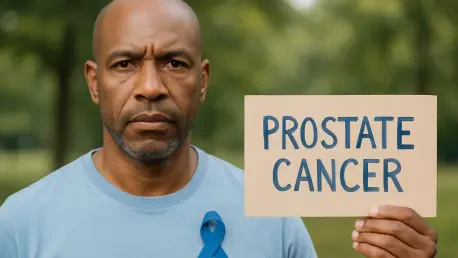In a quiet corner of Devon, UK, Jason Yeo, a 54-year-old father of two and a traveling sales manager, faced a challenge he never saw coming—a prostate cancer diagnosis in April 2024 that could have easily slipped under the radar. With no prior health issues or noticeable symptoms, his story serves as a stark reminder of how silently this disease can progress in its early stages, often evading detection until it’s too late. What transformed this potential tragedy into a tale of triumph wasn’t just medical intervention, but Jason’s unrelenting determination to push for answers when the system initially suggested waiting. His journey through uncertainty, emotional strain, and eventual remission highlights not only the importance of early detection but also the power of self-advocacy in navigating complex healthcare landscapes. This account delves into the layers of his experience, from the initial shock of diagnosis to becoming a beacon of awareness, shedding light on broader systemic issues and emerging hopes in the fight against prostate cancer.
Uncovering a Hidden Danger
Jason Yeo’s battle began unexpectedly with a routine health check in early 2023, an act spurred by a thoughtful voucher gifted by his wife, Donna. A simple prostate-specific antigen (PSA) test revealed elevated levels, signaling a potential problem despite the absence of any physical symptoms. This moment underscores a critical reality about prostate cancer: it often remains hidden in its early phases, making it a silent threat for many men, particularly those over 50. The NHS emphasizes that early detection can be a game-changer, potentially leading to successful treatment and cure. Jason’s case illustrates how a seemingly minor test, prompted by chance, can uncover a life-threatening condition that might otherwise go unnoticed until it advances to a more dangerous stage. The significance of such routine screenings cannot be overstated, as they provide a window of opportunity for intervention before the disease progresses beyond control.
The lack of symptoms in Jason’s early diagnosis paints a broader picture of why prostate cancer remains a formidable public health challenge in the UK, claiming around 12,000 lives annually according to Cancer Research UK. Many men, like Jason, lead active, healthy lives with no inkling of the danger brewing within. This silent progression often delays diagnosis, reducing the chances of effective treatment. Health authorities continue to grapple with the best approach to widespread screening, as current methods like PSA testing aren’t universally endorsed due to varying effectiveness. Jason’s experience adds a personal dimension to this ongoing debate, showing how a single test, even if imperfect, can serve as the first line of defense. It highlights the urgent need for increased awareness among men to prioritize regular health checks, especially as they age, to catch potential issues before they escalate into something far more severe.
Navigating Emotional Turbulence
Following the initial diagnosis, medical professionals at Torbay Hospital advised Jason to follow a strategy known as “active surveillance,” a common approach for low-grade prostate cancers confined to the gland. This meant regular monitoring without immediate treatment, a decision that plunged Jason and his family into a state of profound mental anguish. The uncertainty of whether the cancer could spread unchecked weighed heavily on their minds, turning everyday life into a waiting game filled with fear. This emotional toll reveals a significant gap in patient care during such periods, where the psychological impact of living with a potential threat often goes unaddressed. Better communication from healthcare providers about the rationale behind surveillance, coupled with access to mental health support, could alleviate much of this distress for countless others in similar situations.
The psychological burden Jason endured also points to a broader issue within cancer care protocols. While active surveillance is grounded in evidence for certain cases, ensuring the cancer doesn’t require immediate aggressive action, it can feel like inaction to patients desperate for resolution. For Jason, each passing day under this protocol heightened the dread of progression, underscoring how standardized medical strategies don’t always align with individual emotional needs. This discrepancy calls for a more tailored approach in patient care, where emotional well-being is prioritized alongside physical health. Enhancing support systems, such as counseling services or clearer explanations of medical decisions, could bridge this gap, ensuring patients feel heard and supported rather than left to grapple with uncertainty alone. Jason’s struggle is a poignant reminder of the human side of medical decisions, urging a rethink of how care is delivered during such vulnerable times.
Pushing Against the Tide
Unwilling to accept the passive approach of active surveillance, Jason, bolstered by encouragement from his wife and father, decided to take matters into his own hands by seeking second opinions and funding private MRI scans. This persistence proved to be a turning point, as further testing uncovered a more aggressive form of cancer than initially suspected, necessitating urgent action. His determination to dig deeper, even when advised to wait, highlights a critical lesson: patients sometimes must advocate fiercely for themselves to ensure their concerns are fully addressed. This raises important questions about whether standard healthcare protocols within systems like the NHS always cater to individual circumstances, especially when initial assessments might underestimate the severity of a condition.
Jason’s proactive stance also sheds light on the disparities in healthcare access and the role of personal initiative in securing timely intervention. Not every patient has the resources or support to pursue additional testing outside the public system, which can mean the difference between early treatment and a delayed, more dangerous progression. His story underscores the need for more equitable access to advanced diagnostics, ensuring that financial constraints or systemic limitations don’t hinder life-saving care. It also prompts a reflection on how healthcare providers can better encourage patient input, fostering a collaborative environment where concerns are taken seriously from the outset. Jason’s experience serves as a powerful example of how pushing against initial medical advice, when driven by informed instinct, can alter the course of one’s health journey dramatically.
Embracing Cutting-Edge Solutions
Through relentless advocacy, Jason secured a referral for cryotherapy, a less invasive treatment option not widely accessible across the UK, facilitated by the charity Prost8 at Imperial College Healthcare NHS Trust. Unlike traditional surgeries such as prostatectomy, which can lead to significant side effects like urinary incontinence or erectile dysfunction, cryotherapy offered a chance to preserve quality of life while effectively targeting the cancer. This innovative approach marked a pivotal moment in Jason’s journey, allowing him to achieve remission with fewer physical burdens. His access to this treatment, however, reveals a stark disparity in availability, as many patients may not even be aware of or have the means to pursue such alternatives within the public health framework.
The limited reach of treatments like cryotherapy points to a broader challenge in healthcare equity, where geographic location or financial capability often dictates the options available to patients. Jason’s successful outcome with this method underscores the potential benefits of expanding access to non-traditional interventions, which could transform outcomes for countless others battling prostate cancer. Health systems must prioritize awareness and distribution of such therapies, ensuring they aren’t reserved for a fortunate few who can navigate the complexities of securing them. Advocacy groups and charities play a crucial role here, often filling gaps left by public systems, but systemic change is needed to integrate these solutions more broadly. Jason’s case is a testament to the life-changing impact of innovative care when it’s within reach, urging a push for policies that make such advancements a standard rather than an exception.
Transforming Struggle into Advocacy
After achieving remission, Jason turned his personal ordeal into a mission for change by launching the “Kick Prostate Cancer into Touch” campaign, collaborating with nearly 70 football clubs across the UK to promote PSA testing among men over 50. His initiative aims to save lives by raising awareness about the importance of early detection, leveraging the community spirit of sports to reach a wide audience. This shift from patient to advocate demonstrates how individual experiences can fuel broader societal impact, inspiring others to take proactive steps toward their health. Jason’s campaign is a beacon of hope, showing that even in the face of life-threatening illness, one can emerge with a purpose to prevent others from enduring similar hardships.
Beyond personal inspiration, Jason’s efforts align with a critical need to address prostate cancer at a grassroots level, where awareness often lags behind other health issues. By partnering with football clubs, he taps into a cultural touchstone that resonates with many men, breaking down barriers of stigma or reluctance around health screenings. His work also complements larger systemic initiatives, amplifying the message that early testing can be a lifesaver. The campaign’s focus on community engagement highlights an effective strategy for public health outreach, where trusted local institutions can play a pivotal role in spreading vital information. Jason’s transformation into an advocate illustrates the ripple effect of personal resilience, encouraging a collective movement to confront prostate cancer head-on with informed action and solidarity.
Addressing Broader Health Challenges
Prostate cancer continues to pose a significant public health concern in the UK, with annual deaths numbering around 12,000 as reported by Cancer Research UK. Despite the consensus on the importance of early detection, there remains no unified agreement on the most effective screening method, with health authorities expressing caution about routine PSA testing due to inconsistent evidence on its benefits versus risks. This ongoing debate often leaves patients and doctors in a gray area, balancing the potential for overdiagnosis against the danger of missing aggressive cases. Jason’s experience adds a human layer to these statistics, emphasizing the personal cost of delayed or uncertain diagnostic pathways in a system striving to standardize care.
The complexity of screening protocols also reflects deeper systemic challenges within healthcare, where resource allocation and evidence-based policy must contend with individual urgency. While PSA testing flagged Jason’s condition early, its limitations as a universal tool mean many men might not receive timely warnings. This gap fuels the argument for tailored approaches, where risk factors like age or family history guide testing decisions rather than a one-size-fits-all model. Public health campaigns and patient stories alike play a vital role in bridging this divide, pushing for education that empowers men to discuss screening with their doctors. Jason’s journey through the uncertainties of diagnosis underscores the need for a nuanced strategy that respects both scientific caution and the pressing realities faced by those at risk.
Looking Ahead with Innovation
Recent developments, such as the £42 million Transform screening trial announced in May 2024, signal a promising shift toward revolutionizing prostate cancer diagnosis, with goals to reduce deaths by up to 40%. This large-scale research effort aims to refine detection methods, potentially overcoming the current limitations of PSA testing and paving the way for more accurate, accessible screening. Jason’s advocacy through his “Kick Prostate Cancer into Touch” campaign dovetails with such initiatives, creating a synergy between individual action and systemic progress. Together, they paint a hopeful picture of a future where early detection becomes a standard practice, significantly altering the landscape of prostate cancer outcomes for generations to come.
The intersection of grassroots efforts and cutting-edge research offers a multifaceted approach to tackling this disease, addressing both immediate awareness and long-term solutions. Trials like Transform represent a commitment to evidence-based advancements, ensuring that future protocols are grounded in robust data. Meanwhile, campaigns led by survivors like Jason keep the conversation alive in communities, ensuring that men don’t wait for systemic change to take charge of their health. This dual momentum is crucial, as it combines the urgency of now with the promise of tomorrow. The fight against prostate cancer stands to gain immensely from such collaborative efforts, where personal stories fuel public action and scientific strides offer tangible hope for reducing the disease’s devastating toll.
A Legacy of Determination
Reflecting on Jason Yeo’s path, it’s evident that his unwavering resolve in the face of a prostate cancer diagnosis turned a personal crisis into a lifeline not just for himself, but for many others. His journey through the shock of discovery, the strain of uncertainty, and the eventual triumph over the disease with innovative treatment showcased the impact of standing firm against initial medical recommendations when instinct demanded more. What emerged from this struggle was a renewed purpose, as he spearheaded a campaign that reached across the UK, urging men to prioritize early testing. His story, set against the backdrop of thousands of annual deaths from this disease, became a catalyst for change, proving that one man’s fight could resonate widely.
The legacy of Jason’s determination also points to actionable steps for the future. Health systems must consider how to better integrate patient advocacy into care models, ensuring voices like his are heard early. Expanding access to treatments like cryotherapy and supporting research initiatives remains critical to prevent others from facing similar barriers. His campaign lays a foundation for community-driven awareness, a model that could inspire similar efforts for other health challenges. Ultimately, Jason’s experience reinforces a vital message: proactive health measures, combined with persistent self-advocacy, can shift outcomes dramatically, offering a blueprint for men everywhere to take control of their well-being with confidence and urgency.









